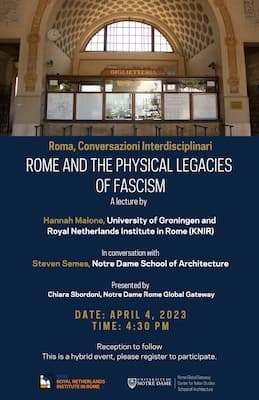This is an invited lecture at the Rome Globe Gateway by Professor Hannah Malone of the University of Groningen and Visiting Professor at the Royal Netherlands Institute in Rome (KNIR), entitled:
Rome and the Physical Legacies of Fascism
Rome is the city of the Popes, but it was once also the city of the Fascists. Mussolini’s regime left a considerable mark on the city in the form of architecture, monuments, and large urban projects. Since the fall of Fascism at end of the Second World War, Romans have faced the question of what to do with the physical traces of the regime, and whether to preserve, demolish, alter, or renovate its buildings and monuments. Fascist sites represent a difficult heritage that elicits divisive and painful memories, but which is also too important to be ignored. Under Fascism, Italian architecture enjoyed a period of innovation and experimentation that benefited from the influences of both classicism and modernism. Today, as the rule of a far-Right government fuels anxieties around the lasting impact of Fascism, this reawakens questions about how to handle material legacies of the Fascist dictatorship.

Hannah Malone is Assistant Professor in Contemporary History at the University of Groningen. She uses architecture and built space to explore the past. She is the author of a monograph entitled Architecture, Death and Nationhood (Routledge, 2017) and a prize-winning article on “The Republican legacy of Italy’s Fascist ossuaries of the First World War” (Modern Italy, March 2019). Her current project explores what happened to Italy’s Fascist Party Headquarters (case del fascio) after the fall of Mussolini’s dictatorship. She is also completing a book on Italy’s Fascist military ossuaries (sacrari) of the First World War.
People can register to the virtual version of the event through this zoom link.